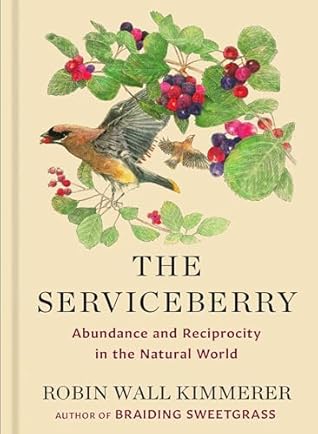More on this book
Community
Kindle Notes & Highlights
Read between
October 29 - October 30, 2025
Ethnobotanists know that the more names a plant has, the greater its cultural importance.
Instead of changing the land to suit their convenience, they changed themselves.
your life is nurtured from the body of Mother Earth. With
Recognizing “enoughness” is a radical act in an economy that is always urging us to consume more.
If the Sun is the source of flow in the economy of nature, what is the “Sun” of a human gift economy, the source that constantly replenishes the flow of gifts? Maybe it is love.
Take the books, enjoy them, bring them back so someone else can enjoy them, with literary abundance for all. And all you need is a library card, which is a kind of agreement to respect and take care of the common good.
We grumble about paying taxes, but in essence this legal obligation is an investment in collective care, in the commons.
What would it be like to consume with the full awareness that we are the recipients of earthly gifts, which we have not earned? To consume with humility?
The practice of observing the living world and taking inspiration for human ways of living from its model is an essential element of Indigenous science. It embraces the reality that there are intelligences other than our own, from whom we might learn.
I lament my own immersion in an economy that grinds what is beautiful and unique into dollars, converts gifts to commodities in a currency that enables us to purchase things we don’t really need while destroying what we do.
We’ve created a system such that we self-identify as consumers first before understanding ourselves as ecosystem citizens. In ecological economics, the focus is on creating an economy that provides for a just and sustainable future in which both human life and nonhuman life can flourish.”
even ecologists are reevaluating the assumption that intense competition is the primary force regulating evolutionary success. Evolutionary biologist David Sloan Wilson has found that competition makes sense only when we consider the unit of evolution to be the individual. When the focus shifts to the level of a group, cooperation is a better model, not only for surviving but for thriving.
Richard Powers comments, “There is symbiosis at every single level of living things, and you cannot compete in a zero-sum game with creatures upon whom your existence depends.”
natural selection favors those who can avoid competition.
“If there’s not enough of what you want, then want something else.”
Diversity in ways of being is an antidote.
In order for capitalist market economies to function, there must be scarcity, and the system is designed to create scarcity where it does not actually exist.
Wealth is much more than what GDP measures, and the market is not the only source of economic value. She urges policymakers to recognize the values of common lands, green space, biodiversity. Her models incorporate the “productivity” of unpaid labor like family care and volunteering, growing a garden—those elements of thriving that never appear in a spreadsheet, but are essential to our wellbeing.
A fellow tribal member captured my thoughts when she wrote, “If the economy requires people to consume more resources than the Earth can replenish, just to keep the whole thing from collapsing, isn’t it time for a new economy?”
economy of extractive capitalism, of abusing the gifts of Mother Earth, is a crime against Nature.
Already the land is too quiet. What if our metrics for well-being included birdsong, the crescendo of Crickets on a summer evening, and neighbors calling to each other across the road?


